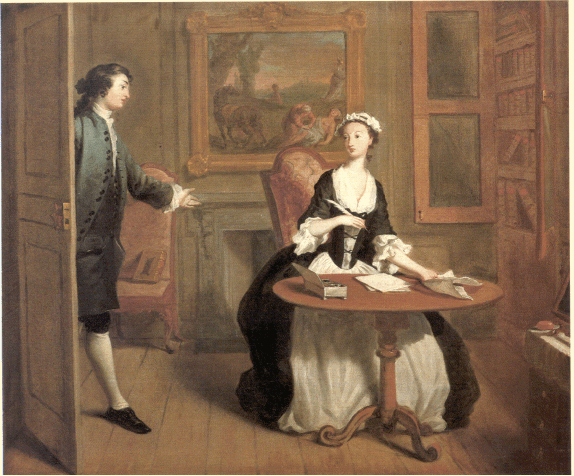
The Road to Riches Is Paved with Prudishness and Prose

Pamela, elevated to fame and infamy with her own novel alternately titled “Virtue Rewarded”–the most popular novel of her time–preserves her virtue, and thus her value, increasing throughout the novel the price her master, Mr. B., will pay to have her; her virtue, attractiveness, and writing skills attract him, and thus reward her–albeit with three rape attempts and a marriage proposal. Mr. B., the ultimate reformed rake slash player of the 18th Century, foreshadows a theme all too common in 20th and 21st Century rap: he says “her Person made me her Lover; but her Mind made her my Wife.” Likewise, Pamela’s “Virtue Rewarded” her author, Samuel Richardson, who also rose to fame and infamy via her purported prudishness. If Pamela is the fictional Beyonce of her time, able to impress and hook Jay-Z and her fans with her beauty first then talent, Richardson is her parents.
Richardson said he wanted to write a novel divorced from others of that time, called “scandal fiction,” and to extol virtue while not arousing. Pamela does not escape the trappings of the novel as an emerging genre, nor would Pamela have sold as many copies if its audience was not, like Mr. B., hung on the prospect of will-they-or-won’t-they (rape or get married). Richardson’s writing is, of course, as prudish and unwittingly titillating as Pamela herself; he didn’t realize his work was bolstered by trappings of soft-core porn.
Pamela succeeds at what the unnamed protagonist of Haywood’s Fantomina attempts and more: to maintain her master’s interest. He is aroused not by her role-playing and donning costumes to “keep the flame alive,” as Haywood’s Beauplasir is (channeling bored-in-the-bedroom couples), but by being true to herself (and not sleeping with him, which helps). Pamela is of lower birth and—we are meant to believe—does not want to attract her master. She–Richardson–dangles the prize, her virginity, whether witting or unwittingly, throughout part I of the book, which keeps Mr. B., and us, the other readers of her letters, hooked.
Mr. B. argues she is not as innocent as she seems: “(for I find she is a mighty letter-writer!) to her father and mother, and others, as far as I know, in which representing herself as an angel of light, she makes her kind master and benefactor, a devil incarnate…” Because of her writing, the servant Pamela wields the power of the pen over her master, who is a magistrate and voting member of Parliament. Her writing–her “accounts,” a term denoting economics as well as writing–elevate her to his level, which he later uses to justify marrying her. When he shows her journals and letters to his sister and Pamela’s biggest detractor Lady Davers, even she is bowled over. Pamela’s ability to write her own story to “others, as far as I know” mirrors the lower-class Richardson’s ability to write his own story/novel, which elevates him to the level of the more affluent writers of his time. Her story is the story of the newly invented printing press at that time; that she is a servant who reads and writes creates a power dynamic between the couple that would not have existed before that revolution in mass communication, which coincided with increased the literacy rate of women of her station.
Though we are supposed to believe Pamela is modest and artless, we learn of her excellent writing, attractiveness and virtue–from Pamela herself. This is the constraint of the epistolary novel, which relies largely on her accounts. Had Richardson used an omniscient narrator to claim Pamela’s virtue for her, she wouldn’t have to backdoor brag all the time; and yet, Pamela also wouldn’t be as personal to her. Or as voyeuristic.

